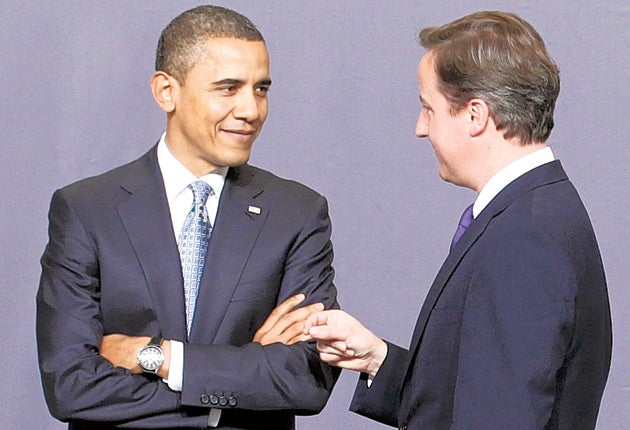Britain 'paranoid' about special relationship, US officials said

American officials ridiculed British politicians for being "paranoid" about the UK's much-vaunted special relationship with the United States, leaked diplomatic cables reveal.
As Prime Minister Gordon Brown tried to woo Barack Obama to support his international initiatives, the Foreign Office fretted over whether the incoming president would distance himself from Britain.
At the same time, the Conservative opposition under David Cameron was desperate to parade its Atlanticist credentials to Washington. The Tories promised US officials they would run a "pro-American regime" if they came to power and would buy more US arms.
Cables passed to the WikiLeaks website show that US embassy officials in London were exasperated by Britain's "paranoid" fears that the "special relationship" might be diluted.
The "paranoia" reached new heights after Mr Obama became president. A classified dispatch in February 2009 was headed: "The British ask, is our special relationship still special in Washington?"
Richard LeBaron, the US deputy chief of mission, wrote: "More than one HMG [government] senior official asked embassy officers whether President Obama meant to send a signal in his inaugural address about US-UK relations by quoting Washington during the revolutionary war, while the removal of the Churchill bust from the Oval Office consumed much UK newsprint... This period of excessive UK speculation about the relationship is more paranoid than usual... This over-reading would often be humorous if it were not so corrosive."
But Mr LeBaron cautioned Washington against taking advantage of British anxieties. He said the UK remained highly useful to the US because of its "unparalleled" help in promoting American aims.
"Though tempting to argue that keeping HMG off balance about its current standing with us might make London more willing to respond favourably when pressed for assistance, in the long run it is not in US interests to have the UK public concluding the relationship is weakening, on either side.
"The UK's commitment of resources – financial, military, diplomatic – in support of US global priorities remains unparalleled; a UK public confident that the USG [United States Government] values those contributions and our relationship, matters to US national security."
A year ago, Louis Susman, the US ambassador, met Liam Fox, then
shadow Defence Secretary, and reported that he had affirmed his desire to work closely with the US if the Tories won the forthcoming election.
"We intend to follow a much more pro-American profile in procurement," Dr Fox was quoted as saying. "The US and UK will continue to fight together in the future". Dr Fox also "expressed confidence regarding US leadership in Afghanistan".
Dr Fox, now Defence Secretary, is seen as the most enthusiastic Cabinet supporter of close US links. In 1997, he set up a Atlantic Bridge, a network to enable conservatives in both countries to share policy ideas.
He admitted, however, that not everyone in the Tory Party shared his views. The confidential cable said: "Fox asserted that some within the Conservative Party are less enthusiastic, asserting that 'We're supposed to be partners with, not supplicants to, the United States.' Fox said he rebuffed these assertions, and he welcomed the ambassador's reassurance that senior US leaders value the UK as an equal partner."
In 2008, William Hague, then shadow Foreign Secretary, pledged loyalty in a meeting with Mr LeBaron. He described Mr Cameron, George Osborne and himself as "staunch Atlanticists".
Join our commenting forum
Join thought-provoking conversations, follow other Independent readers and see their replies
Comments
Bookmark popover
Removed from bookmarks